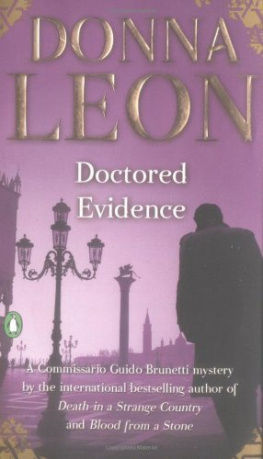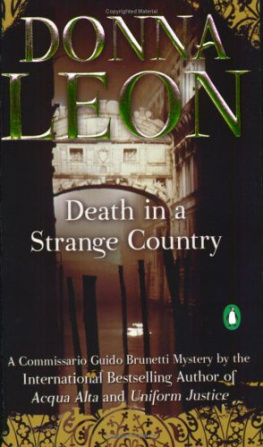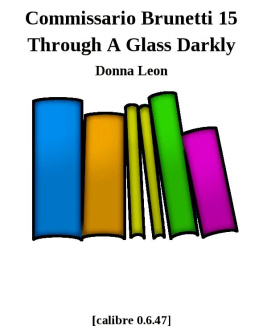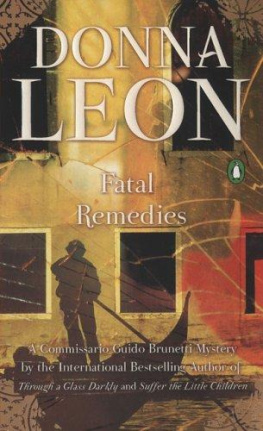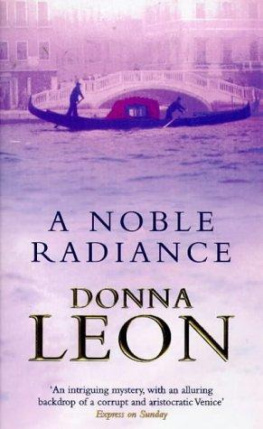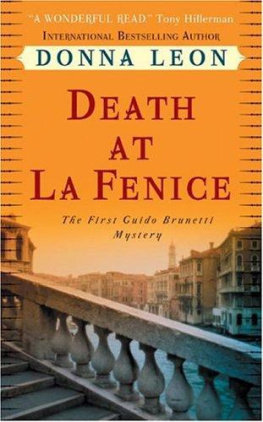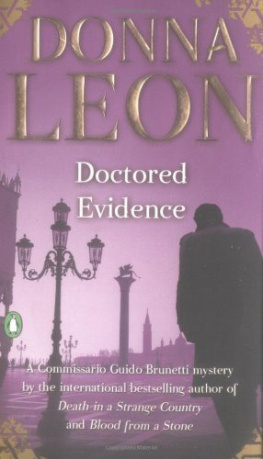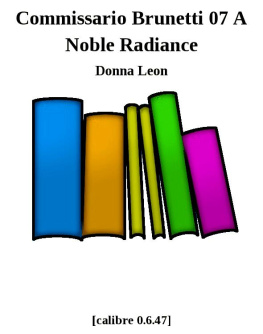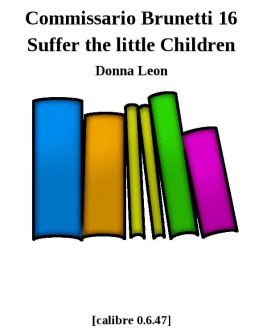Also by Donna Leon
Death at La Fenice
Death in a Strange Country
The Anonymous Venetian
A Venetian Reckoning
Acqua Alta
The Death of Faith
A Noble Radiance
Fatal Remedies
Friends in High Places
A Sea of Troubles
Wilful Behaviour
Uniform Justice
Donna Leon
DOCTORE D EVIDENCE
arrow books
Published in the United Kingdom in 2005 by Arrow Books
13579108642
Copyright Donna Leon and Diogenes Verlag AG Zurich 2004
Donna Leon has asserted her right under the Copyright, Designs and Patents Act, 1988 to be identified as the author of this work
This novel is a work of fiction. Names and characters are the product of the author's imagination and any resemblance to actual persons, living or dead, is entirely coincidental
This book is sold subject to the condition that it shall not, by way of trade or otherwise, be lent, resold, hired out, or otherwise circulated without the publisher's prior consent in any form of binding or cover other than that in which it is published and without a similar condition including this condition being imposed on the subsequent purchaser
First published in the United Kingdom in 2003 by William Heinemann
Arrow Books The Random House Group Limited 20 Vauxhall Bridge Road, London, SW1V 2SA
Random House Australia (Pty) Limited 20 Alfred Street, Milsons Point, Sydney New South Wales 2061, Australia
Random House New Zealand Limited 18 Poland Road, Glenfield Auckland 10, New Zealand
Random House (Pty) Limited Endulini, 5a Jubilee Road, Parktown 2193, South Africa
The Random House Group Limited Reg. No. 954009
A CIP catalogue record for this book is available from the British Library
Papers used by Random House are natural, recyclable products made from wood grown in sustainable forests. The manufacturing processes conform to the environmental regulations of the country of origin
ISBN 0 09 944675 8
Typeset by SX Composing DTP, Rayleigh, Essex Printed and bound in Germany by GGP Media GmbH, Possneck
for Alan Curtis
Signor dottore
Che si pud fare
Honoured doctor
What can be done?
Cosi fan tutte
- Mozart

She was an old cow and he hated her. Because he was a doctor and she his patient, he felt guilty about hating her, but not so guilty as to make him hate her any the less. Nasty, greedy, ill-tempered, forever complaining about her health and the few people who still had the stomach for her company, Maria Grazia Battestini was a woman about whom nothing good could be said, not even by the most generous of souls. The priest had given up on her long ago, and her neighbours spoke of her with distaste, sometimes with open animosity. Her family remained connected to her only by means of the laws governing inheritance. But he was a doctor, so he had no choice but to make his weekly visit, even though i t now consisted of nothing more than a perfunctory inquiry as to how she felt, followed by the speedy measuring of her pulse and blood pressure. He'd been coming for more than four years now, and his aversion had become so strong that he had lost the fight against his repeated disappointment at the continued absence of signs of illness. Just past eighty, she looked and acted a decade older, but she'd live to bury him; she'd live to bury them all.
He had a key and used it to let himself into the building. The whole place was hers, all three floors, though she occupied only half of the second. Spite and meanness caused her to maintain the fiction that she occupied all of it, for by so doing she kept her sister Santina's daughter from moving into either the floor above or the one below. He forgot how many times, in the years since the death of her son, she had hurled abuse upon her sister and told him how much pleasure it gave her perpetually to frustrate her family's designs upon the house. She spoke of her sister with malice that had gathered momentum ever since their shared childhood.
He turned the key to the right, and because it is in the nature of Venetian doors not to open at first try, he automatically pulled the door towards him as he turned the key. He pushed the door open, stepping into the dim entrance hall. No sunlight could penetrate the decades of grease and dirt that covered the two narrow windows above the door to the calle . He no longer noticed the dimness, and it had been years since Signora Battestini had been able to come down the steps, so the windows were unlikely to be cleaned any time soon. Damp had fused the wires years before, but she refused to pay for an electrician, and he had lost the habit of trying to switch the light on.
He started up the first flight of stairs, glad that this was his last call of the morning. He'd finish with the old horror and go and have a drink, then get some lunch. He didn't have to be at his surgery to see patients until five; had no plans after lunch and nothing he particularly wanted to do, so long as he could be free of the sight and sound of their wasted and bloated bodies.
As he started up the second flight, he found himself hoping mat the new woman - he thought this one was Romanian, for that was how the old woman referred to her, though they never stayed long enough for him to remember their names - would last. Since her arrival, the old shrew was at least clean and no longer stank of urine. Over the years he'd watched them come and go; come because they were drawn by the prospect of work, even if it meant cleaning and feeding Signora Battestini and submitting to her unrelenting abuse; go because each had eventually been so worn down that even the most abject need could not resist the assault of the woman's nastiness.
From the habit of politeness, he knocked at her door, though he knew it a futile courtesy. The blaring of her television, which had been audible even from outside the building, drowned out the sound: even the younger ears of the Romanian - what was her name? - seldom registered his arrival.
He took the second key and turned it twice, then stepped into the apartment. At least it was clean. There had been a time, he thought it was about a year after her son died, when no one had come for more than a week, and the old woman had been left alone in the apartment. He still remembered the smell of the place when he'd opened the door for his then bi-monthly visit, and, when he'd gone into the kitchen, the sight of the plates of decomposing food left on the table for a week in the July heat. And the sight of her, body encased in layers of fat, naked and covered with the drips and dribbles of what she had tried to eat, hunched in a chair in front of the eternally blaring television. She'd ended up in hospital that time, dehydrated and disoriented, but they'd wanted quit of her after only three days, and since she demanded to be in her own home, they'd gladly taken the option and had her carried there. The Ukrainian woman had come then, the one who'd disappeared after three weeks, taking a silver serving plate with her, and his visits had been increased to once a week. But the old woman had not changed: her heart pounded on, her lungs pulled in the air of the apartment, and the layers of fat grew ever thicker.
He set his bag on the table by the door, glad to see that its surface was clean, a sure sign that the
Romanian was still there. He took the stethoscope, hooked it behind his ears, and went into the living room.
Had the television not been on, he probably would have heard the noise before he went in. But on the screen the much-lifted blonde with the Shirley Temple curls was giving the traffic report, alerting the drivers of the Veneto to the potential inconvenience of traf fico intenso on the A4 and drowning the industrious buzzing of the flies at work on the old woman's head.

